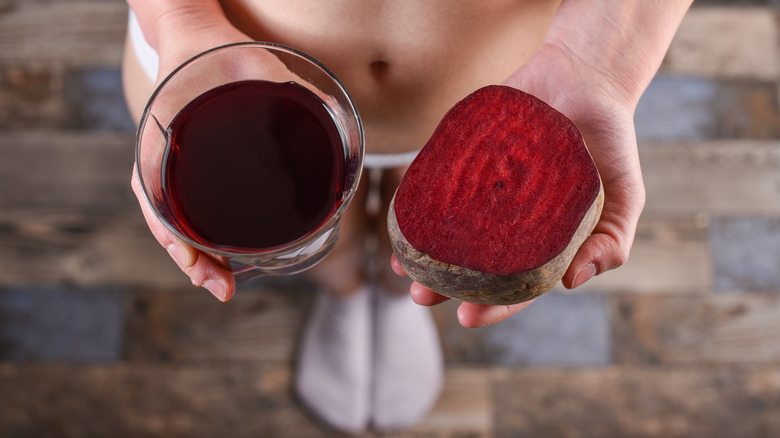The Wildly Underrated Vegetable Juice That Can Boost Your Liver Health
Your liver works 24/7 to detoxify your blood and sweep waste from your body, among other essential functions. To keep it performing at optimal levels, you might want to start drinking a wildly underrated juice that's not on a lot of people's shopping lists.
It's beet juice, which is sometimes referred to as beetroot juice. You might have bypassed beet juice in favor of other juices because, to be honest, beets aren't winning over the hearts of Americans. On the contrary, according to a 2019 survey issued by VeggieTracker (via Fox News), the red-tinged vegetable landed squarely among the least popular veggies in the United States. However, even if you've never enjoyed beets, you might want to reconsider developing a relationship with their juice for the good of your liver. (You can always add it to a smoothie if you don't like the taste of it straight.)
To better understand what makes beet juice a treat for your body's biggest organ, Health Digest turned to the expertise of Dr. Chris Mohr, who is the fitness and nutrition advisor at BarBend. Dr. Mohr quickly highlighted the main liver-friedly nutritional component in beet juice: "Beets (and beet juice) contain the antioxidant betaine, which has been shown (in animal studies) to have benefits for the liver."
Exploring the potential benefits of betaine
Dr. Mohr added that betaine has shown promise in reducing fat deposits within the liver, thereby preventing or decreasing the risk of the development of liver disease. Though he stated that human studies on betaine's liver effects haven't been as conclusive as those on animals, he said that some suggested a link between betaine and reduced high liver enzymes. For example, consider a 2022 animal-focused study on betaine's liver impact conducted on mice. Published in Foods, the study's findings indicated that a daily 1% concentration of betaine increased liver fat oxidation in the mice, as well as improved their general liver process efficiency.
A 2023 study on betaine's promise as a means to decrease fatty liver disease among human participants (via Frontiers in Nutrition) revealed equally positive findings. When taken alone or as part of a Mediterranean diet, a daily 250 mg betaine supplement produced liver-related health outcomes after 12 weeks. Specifically, subjects' "bad" LDL cholesterol levels dipped and their "good" HDL cholesterol levels rose in tandem with taking betaine.
This begs the question: How can you be sure you're getting enough betaine in your beet juice to get a benefit? A chart of betaine concentration within a 2023 Molecules article shows an average of 750 to 1,290 micrograms per gram of beet. This puts beet among the highest-ranking fruits and vegetables containing betaine and implies that beet juice is a solid betaine food source.
Weighing the merits of juice versus raw food
You needn't worry that you're getting less betaine by opting for beet juice instead of eating raw or cooked beets. As explained by Dr. Mohr, beet juice and whole beets offer similar nutritional benefits. The main difference, he said, lies in their fiber content: "Whole beets contain dietary fiber, which aids in digestion, stabilizes blood sugar, and supports gut health, but this fiber is removed in beet juice." Therefore, he's supportive of choosing beet juice over beets, particularly if you're not a fan of beets due to their texture.
In fact, juicing might enable you to get a more bioavailable form of the betaine in beets. Noted Dr. Mohr, "Beet juice also makes nutrients like betaine more quickly absorbable." His assertion is supported in a 2021 review in Nutrients that revealed that juicing could improve the bioaccessibility of a fruit's nutrients. As such, you may not have to worry about losing any betaine by drinking beet juice instead of eating beets.
And you're not just getting liver-boosting betaine from a daily dose of beet juice, either. You're also getting vitamins and minerals in addition to other antioxidants. According to Dr. Mohr, all those nutrients could boost your cardiovascular health. There's just one caveat: Try not to overdo your beet juice consumption if your body tends to produce kidney stones. As Dr. Mohr cautioned, "Moderation is key since beets contain oxalates, which may increase the risk of kidney stones in some people."


